Share your thoughts on the downfall of Lance Armstrong at CNN iReport, Facebook or Twitter.
(CNN) -- After years of tenacious spin that he was innocent, Lance Armstrong has backpedaled in a confessional interview with Oprah Winfrey.
He admitted unequivocally to using performance enhancing drugs in his seven Tour de France wins.
But his critics say he is still spinning the story.
Armstrong has, in the past, persistently and angrily denied the allegations -- even under oath.
And he has persecuted former close associates who went public against him. "We sued so many people," Armstrong told Winfrey -- people who were telling the truth.
.cnnArticleGalleryNav{border:1px solid #000;cursor:pointer;float:left;height:25px;text-align:center;width:25px} .cnnArticleGalleryNavOn{background-color:#C03;border:1px solid #000;float:left;height:25px;text-align:center;width:20px} .cnnArticleGalleryNavDisabled{background-color:#222;border:1px solid #000;color:#666;float:left;height:25px;text-align:center;width:25px} .cnnArticleExpandableTarget{background-color:#000;display:none;position:absolute} .cnnArticlePhotoContainer{height:122px;width:214px} .cnnArticleBoxImage{cursor:pointer;height:122px;padding-top:0;width:214px} .cnnArticleGalleryCaptionControl{background-color:#000;color:#FFF} .cnnArticleGalleryCaptionControlText{cursor:pointer;float:right;font-size:10px;padding:3px 10px 3px 3px} .cnnArticleGalleryPhotoContainer cite{background:none repeat scroll 0 0 #000;bottom:48px;color:#FFF;height:auto;left:420px;opacity:.7;position:absolute;width:200px;padding:10px} .cnnArticleGalleryClose{background-color:#fff;display:block;text-align:right} .cnnArticleGalleryCloseButton{cursor:pointer} .cnnArticleGalleryNavPrevNext span{background-color:#444;color:#CCC;cursor:pointer;float:left;height:23px;text-align:center;width:26px;padding:4px 0 0} .cnnArticleGalleryNavPrevNextDisabled span{background-color:#444;color:#666;float:left;height:23px;text-align:center;width:25px;padding:4px 0 0} .cnnVerticalGalleryPhoto{padding-right:68px;width:270px;margin:0 auto} .cnnGalleryContainer{float:left;clear:left;margin:0 0 20px;padding:0 0 0 10px}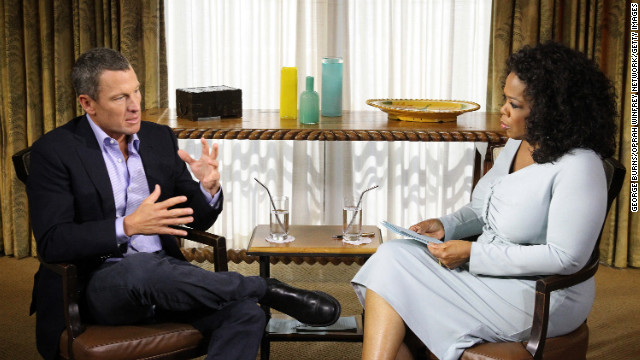 Oprah Winfrey speaks with Lance Armstrong during an interview on the controversy surrounding his cycling career on Monday, January 14, in Austin, Texas. Oprah Winfrey's exclusive no-holds-barred interview with Lance Armstrong, "Oprah and Lance Armstrong: The Worldwide Exclusive," has expanded to air as a two-night event on OWN: Oprah Winfrey Network. The interview airs Thursday, January 17, and Friday, January 18. Cyclist Lance Armstrong has been stripped of his seven Tour de France wins and banned from the tournament for life, the International Cycling Union announced Monday, October 22. Pictured, Armstrong addresses participants at The Livestrong Challenge Ride on Sunday. He stepped down as chairman of his Livestrong cancer charity on Wednesday, October 17. Armstrong leads his teammates during the final stage of the 1999 Tour de France. Armstrong, 17, competes in the Jeep Triathlon Grand Prix in 1988. He became a professional triathlete at age 16 and joined the U.S. National Cycling Team two years later. In 1995, Armstrong wins the 18th stage of the Tour de France. He finished 36th overall and finished the race for the first time that year. Armstrong rides for charity in May 1998 at the Ikon Ride for the Roses to benefit the Lance Armstrong Foundation. He established the foundation to benefit cancer research after being diagnosed with testicular cancer in 1996. After treatment, he was declared cancer-free in February 1997. Armstrong takes his honor lap on the Champs-Élysées in Paris after winning the Tour de France for the first time in 1999. After winning the 2000 Tour de France, Armstrong holds his son Luke on his shoulders. Armstrong rides during the 18th stage of the 2001 Tour de France. He won the tour that year for the third consecutive time. Armstrong celebrates winning the 10th stage of the Tour de France in 2001. After winning the 2001 Tour de France, Armstrong presents President George W. Bush with a U.S. Postal Service yellow jersey and a replica of the bike he used to win the race. Armstrong celebrates on the podium after winning the Tour de France by 61 seconds in 2003. It was his fifth consecutive win. Jay Leno interviews Armstrong on "The Tonight Show" in 2003. After his six consecutive Tour de France win in 2004, Armstrong attends a celebration in his honor in front of the Texas State Capitol in Austin. Armstrong arrives at the 2005 American Music Awards in Los Angeles with his then-fiancee Sheryl Crow. The couple never made it down the aisle, splitting up the following year. Armstrong holds up a paper displaying the number seven at the start of the Tour de France in 2005. He went on to win his seventh consecutive victory. As a cancer survivor, Armstrong testifies during a Senate hearing in 2008 on Capitol Hill. The hearing focused on finding a cure for cancer in the 21st century. In 2009, Armstrong suffers a broken collarbone after falling during a race in Spain along with more than a dozen other riders. Young Armstrong fans write messages on the ground using yellow chalk ahead of the 2009 Tour de France. He came in third place that year. Armstrong launches the three-day Livestrong Global Cancer Summit in 2009 in Dublin, Ireland. The event was organized by his foundation. In May 2010, Armstrong crashes during the Amgen Tour of California and is taken to the hospital. That same day, he denied allegations of doping made by former teammate Floyd Landis. Ahead of what he said would be his last Tour de France, Armstrong gears up for the start of the race in 2010. Lance Armstrong looks back as he rides in a breakaway during the 2010 Tour de France. Armstrong finishes 23rd in the 2010 Tour de France. He announced his retirement from the world of professional cycling in February 2011. He said he wants to devote more time to his family and the fight against cancer. Armstrong's son Luke; twin daughters, Isabelle and Grace; and 1-year-old son, Max, stand outside the Radioshack team bus on a rest day during the 2010 Tour de France. The frame of Armstrong's bike is engraved with the names of his four children at the time and the Spanish word for five, "cinco." His fifth child, Olivia, was born in October 2010. In February 2012, Armstrong competes in the 70.3 Ironman Triathlon in Panama City. He went on to claim two Half Ironman triathlon titles by June. He got back into the sport after retiring from professional cycling. Lance Armstrong over the years Lance Armstrong over the years Lance Armstrong over the years Lance Armstrong over the years Lance Armstrong over the years Lance Armstrong over the years Lance Armstrong over the years Lance Armstrong over the years Lance Armstrong over the years Lance Armstrong over the years Lance Armstrong over the years Lance Armstrong over the years Lance Armstrong over the years Lance Armstrong over the years Lance Armstrong over the years Lance Armstrong over the years Lance Armstrong over the years Lance Armstrong over the years Lance Armstrong over the years Lance Armstrong over the years Lance Armstrong over the years Lance Armstrong over the years Lance Armstrong over the years Lance Armstrong over the years Lance Armstrong over the years Lance Armstrong over the years Lance Armstrong over the years HIDE CAPTION << <
Oprah Winfrey speaks with Lance Armstrong during an interview on the controversy surrounding his cycling career on Monday, January 14, in Austin, Texas. Oprah Winfrey's exclusive no-holds-barred interview with Lance Armstrong, "Oprah and Lance Armstrong: The Worldwide Exclusive," has expanded to air as a two-night event on OWN: Oprah Winfrey Network. The interview airs Thursday, January 17, and Friday, January 18. Cyclist Lance Armstrong has been stripped of his seven Tour de France wins and banned from the tournament for life, the International Cycling Union announced Monday, October 22. Pictured, Armstrong addresses participants at The Livestrong Challenge Ride on Sunday. He stepped down as chairman of his Livestrong cancer charity on Wednesday, October 17. Armstrong leads his teammates during the final stage of the 1999 Tour de France. Armstrong, 17, competes in the Jeep Triathlon Grand Prix in 1988. He became a professional triathlete at age 16 and joined the U.S. National Cycling Team two years later. In 1995, Armstrong wins the 18th stage of the Tour de France. He finished 36th overall and finished the race for the first time that year. Armstrong rides for charity in May 1998 at the Ikon Ride for the Roses to benefit the Lance Armstrong Foundation. He established the foundation to benefit cancer research after being diagnosed with testicular cancer in 1996. After treatment, he was declared cancer-free in February 1997. Armstrong takes his honor lap on the Champs-Élysées in Paris after winning the Tour de France for the first time in 1999. After winning the 2000 Tour de France, Armstrong holds his son Luke on his shoulders. Armstrong rides during the 18th stage of the 2001 Tour de France. He won the tour that year for the third consecutive time. Armstrong celebrates winning the 10th stage of the Tour de France in 2001. After winning the 2001 Tour de France, Armstrong presents President George W. Bush with a U.S. Postal Service yellow jersey and a replica of the bike he used to win the race. Armstrong celebrates on the podium after winning the Tour de France by 61 seconds in 2003. It was his fifth consecutive win. Jay Leno interviews Armstrong on "The Tonight Show" in 2003. After his six consecutive Tour de France win in 2004, Armstrong attends a celebration in his honor in front of the Texas State Capitol in Austin. Armstrong arrives at the 2005 American Music Awards in Los Angeles with his then-fiancee Sheryl Crow. The couple never made it down the aisle, splitting up the following year. Armstrong holds up a paper displaying the number seven at the start of the Tour de France in 2005. He went on to win his seventh consecutive victory. As a cancer survivor, Armstrong testifies during a Senate hearing in 2008 on Capitol Hill. The hearing focused on finding a cure for cancer in the 21st century. In 2009, Armstrong suffers a broken collarbone after falling during a race in Spain along with more than a dozen other riders. Young Armstrong fans write messages on the ground using yellow chalk ahead of the 2009 Tour de France. He came in third place that year. Armstrong launches the three-day Livestrong Global Cancer Summit in 2009 in Dublin, Ireland. The event was organized by his foundation. In May 2010, Armstrong crashes during the Amgen Tour of California and is taken to the hospital. That same day, he denied allegations of doping made by former teammate Floyd Landis. Ahead of what he said would be his last Tour de France, Armstrong gears up for the start of the race in 2010. Lance Armstrong looks back as he rides in a breakaway during the 2010 Tour de France. Armstrong finishes 23rd in the 2010 Tour de France. He announced his retirement from the world of professional cycling in February 2011. He said he wants to devote more time to his family and the fight against cancer. Armstrong's son Luke; twin daughters, Isabelle and Grace; and 1-year-old son, Max, stand outside the Radioshack team bus on a rest day during the 2010 Tour de France. The frame of Armstrong's bike is engraved with the names of his four children at the time and the Spanish word for five, "cinco." His fifth child, Olivia, was born in October 2010. In February 2012, Armstrong competes in the 70.3 Ironman Triathlon in Panama City. He went on to claim two Half Ironman triathlon titles by June. He got back into the sport after retiring from professional cycling. Lance Armstrong over the years Lance Armstrong over the years Lance Armstrong over the years Lance Armstrong over the years Lance Armstrong over the years Lance Armstrong over the years Lance Armstrong over the years Lance Armstrong over the years Lance Armstrong over the years Lance Armstrong over the years Lance Armstrong over the years Lance Armstrong over the years Lance Armstrong over the years Lance Armstrong over the years Lance Armstrong over the years Lance Armstrong over the years Lance Armstrong over the years Lance Armstrong over the years Lance Armstrong over the years Lance Armstrong over the years Lance Armstrong over the years Lance Armstrong over the years Lance Armstrong over the years Lance Armstrong over the years Lance Armstrong over the years Lance Armstrong over the years Lance Armstrong over the years HIDE CAPTION << <  1
1  2
2  3
3  4
4  5
5  6
6  7
7  8
8  9
9  10
10  11
11  12
12  13
13  14
14  15
15  16
16  17
17  18
18  19
19  20
20  21
21  22
22  23
23  24
24  25
25  26
26  27 > >>
27 > >>  Photos: Lance Armstrong over the years
Photos: Lance Armstrong over the years 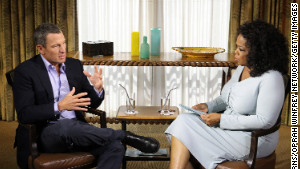 Winfrey to Armstrong: Why confess now?
Winfrey to Armstrong: Why confess now? 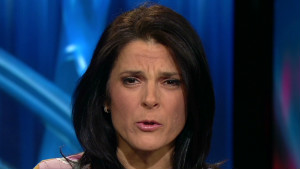 Betsy Andreu 'furious' at Armstrong
Betsy Andreu 'furious' at Armstrong 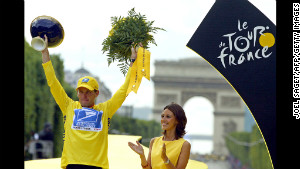 Toobin: Lance Armstrong is in big trouble
Toobin: Lance Armstrong is in big trouble 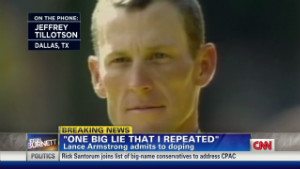 Company plans to sue Armstrong
Company plans to sue Armstrong 12 telling quotes over the years from Armstrong
Did he use the blood enhancing hormone EPO? Testosterone? Cortisone? Human growth hormone? Illegal blood transfusions and other blood doping?
Armstrong answered "yes" on all counts in the first installment of a two-part interview that aired Thursday night. Part two airs Friday on Winfrey's OWN channel and online.
The disgraced cyclist, who has been stripped of his Tour de France titles and an Olympic bronze medal, blamed no one but himself for his doping decisions, careful not to implicate others.
Armstrong: I was "a bully"
Armstrong described himself as "deeply flawed" and "arrogant," and spoke often of how so much was his "fault."
"I was a bully," he told Winfrey of how he treated others who might expose him.
But Armstrong was not telling the whole story, author David Coyle, who wrote a book about doping and the Tour de France, told CNN's Anderson Cooper Thursday night.
"A partial confession is sort of the pattern here," he said. "Maybe this is Armstrong's partial, and more will come out later."
iReport: Tell us your take on the first part of the interview
The cyclist denied pushing teammates to dope, an assertion Coyle countered.
"Tyler Hamilton gets a phone call: be on a plane tomorrow. We're flying to Valencia to do a blood transfusion. That's what happens," Coyle said.
Armstrong told Winfrey that doping was widespread at the time and just as much "part of the job" as water bottles and tire pumps. This attitude prompted Winfrey to ask again if he really didn't coerce other teammates to dope.
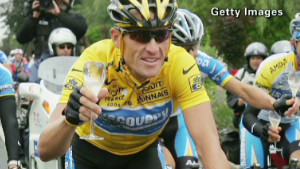 Ex-assistant: 'I don't trust Armstrong'
Ex-assistant: 'I don't trust Armstrong' 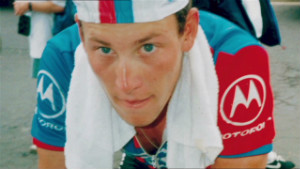 The world according to Lance Armstrong
The world according to Lance Armstrong 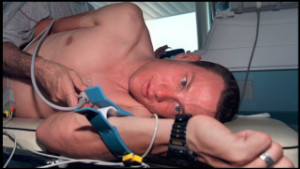 Lance Armstrong's trail of pain
Lance Armstrong's trail of pain 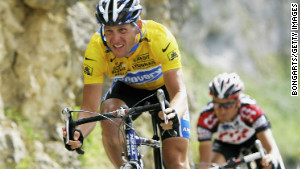 Armstrong's denials through the years
Armstrong's denials through the years Bill Strickland, an editor for Bicycling Magazine, praised Armstrong for the confessions he did make.
"I think it's clear what we're seeing here is someone learning to tell the truth," he said.
Both men described the interview as a "therapy session."
Appearing tense but sometimes cathartic, Armstrong told Winfrey it was a happy day for him to be there with her.
He described his years of denial as "one big lie that I repeated a lot of times." He had races to win and a fairy tale image to keep up.
Armstrong reminisced on his storied past of being a hero who overcame cancer winning the Tour repeatedly, having a happy marriage, children. "It's just this mythic, perfect story, and it isn't true," he said.
It was impossible to live up to it, he said, and it fell apart.
Bleacher Report: Twitter erupts Thursday night
The lies and aggressive pursuit of those debunking them was about controlling the narrative. "If I didn't like what somebody said...I tried to control that and said that's a lie; they're liars," Armstrong said. It's a tac tic he has followed his entire life, he said.
"Now the story is so bad and so toxic, and a lot of it is true," Armstrong said.
The U.S. Anti-Doping Agency, which tests Olympic athletes for performance enhancing drugs, praised the interview as a "small step in the right direction."
But it seemed to share Coyle's skepticism about whether Armstrong was exposing the whole truth.
"If he is sincere in his desire to correct his past mistakes, he will testify under oath about the full extent of his doping activities," said USADA CEO Travis Tygart.
Years of success and defiance, then a rapid fall
The scandal has tarred the cancer charity Livestrong that he founded and blown his endorsement deals.
Those who suffered for speaking out now feel vindicated.
They include Betsy Andreu, wife of fellow cyclist Frankie Andreu, who said she overheard Armstrong acknowledge to a doctor treating him for cancer in 1996 that he had used performance-enhancing drugs.
"This was a guy who used to be my friend, who decimated me," Andreu told CNN's Anderson Cooper on Thursday night. "He could have come clean. He owed it to me. He owes it to the sport that he destroyed."
The former athletic icon conceded he'd let down many fans "who believed in me and supported me."
"I will spend the rest of my life ... trying to earn back trust and apologize to people."
After winning various legs of the Tour de France, Armstrong's sporting career ground to a halt in 1996, when he was diagnosed with cancer. He was 25.
He told Winfrey that he then developed a "ruthless and relentless" attitude that helped him survive. But he carried it with him into his sports career, "and that's bad," he said.
He returned to the cycling world, however. His breakthrough came in 1999, and he didn't stop as he reeled off seven straight wins in his sport's most prestigious race. Allegations of doping began during this time, as did Armstrong's vehement defiance.
He left the sport after his last win, in 2005, only to return to the tour in 2009.
Armstrong still insists he was clean when he finished third that year, but that comeback led to his downfall.
"We wouldn't be sitting here if I didn't come back," he told Winfrey.
In 2011, Armstrong retired once more from cycling. But his fight to maintain his clean reputation continued. Federal prosecutors launched a criminal investigation, but it was dropped in February.
In April, the USADA notified Armstrong of an investigation into new doping charges. In response, the cyclist accused the organization of trying to "dredge up discredited" allegations and filed a lawsuit in federal court trying to halt the case.
The USADA found "overwhelming" evidence that Armstrong was involved in "the most sophisticated, professionalized and successful doping program."
Armstrong objected to the claim to Winfrey, saying that although it was "professional," it did not compare to doping programs in former communist East Germany.
Armstrong told Winfrey that the unraveling of his career is the second time in his life that he could not control his life's narrative -- the last time was when he had cancer.
Livestrong: Tell the truth about doping
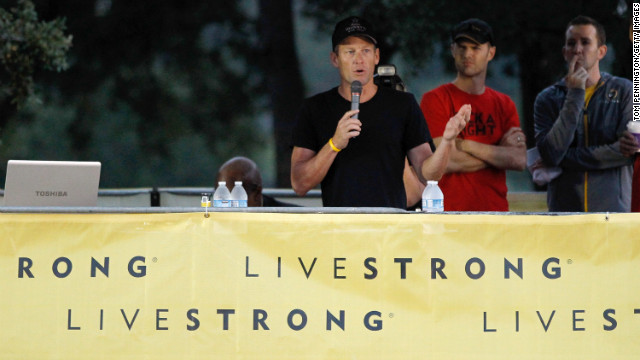 Cyclist Lance Armstrong has been stripped of his seven Tour de France wins and banned from the tournament for life, the International Cycling Union announced Monday, October 22. Pictured, Armstrong addresses participants at The Livestrong Challenge Ride on Sunday. He stepped down as chairman of his Livestrong cancer charity on Wednesday, October 17.
Cyclist Lance Armstrong has been stripped of his seven Tour de France wins and banned from the tournament for life, the International Cycling Union announced Monday, October 22. Pictured, Armstrong addresses participants at The Livestrong Challenge Ride on Sunday. He stepped down as chairman of his Livestrong cancer charity on Wednesday, October 17. 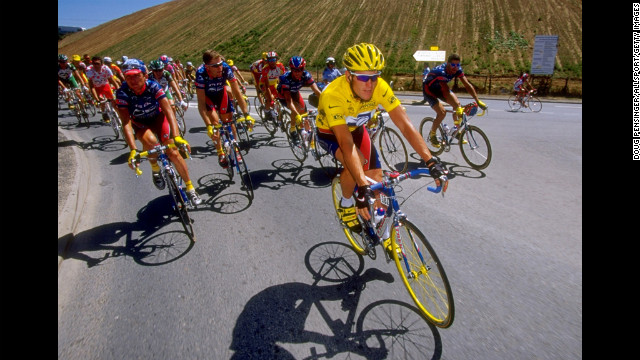 Armstrong leads his teammates during the final stage of the 1999 Tour de France.
Armstrong leads his teammates during the final stage of the 1999 Tour de France. 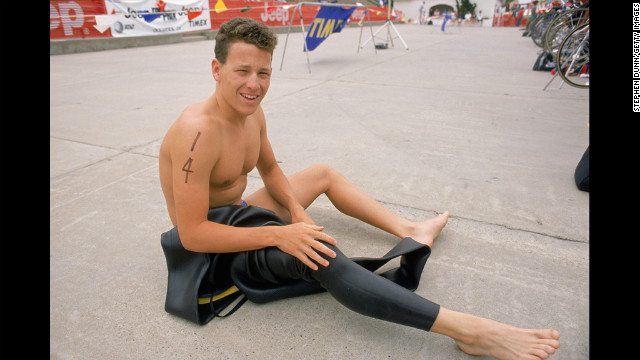 Armstrong, 17, competes in the Jeep Triathlon Grand Prix in 1988. He became a professional triathlete at age 16 and joined the U.S. National Cycling Team two years later.
Armstrong, 17, competes in the Jeep Triathlon Grand Prix in 1988. He became a professional triathlete at age 16 and joined the U.S. National Cycling Team two years later. 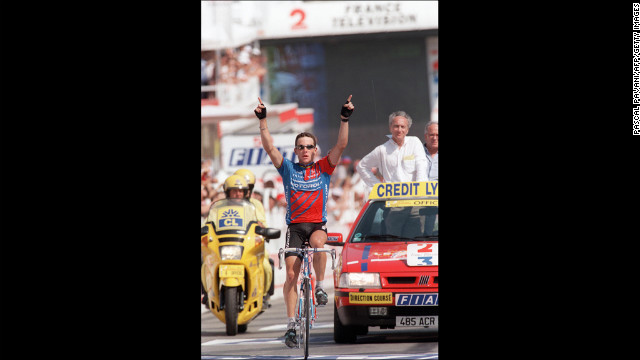 In 1995, Armstrong wins the 18th stage of the Tour de France. He finished 36th overall and finished the race for the first time that year.
In 1995, Armstrong wins the 18th stage of the Tour de France. He finished 36th overall and finished the race for the first time that year. 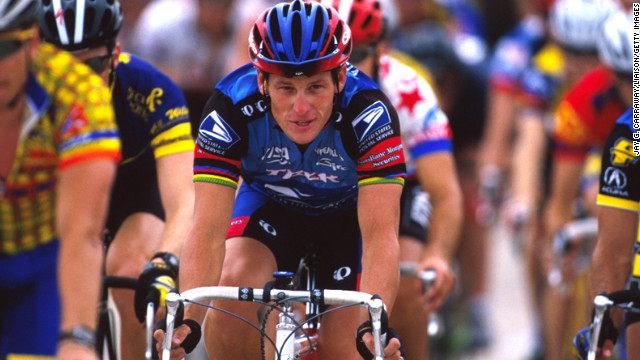 Armstrong rides for charity in May 1998 at the Ikon Ride for the Roses to benefit the Lance Armstrong Foundation. He established the foundation to benefit cancer research after being diagnosed with testicular cancer in 1996. After treatment, he was declared cancer-free in February 1997.
Armstrong rides for charity in May 1998 at the Ikon Ride for the Roses to benefit the Lance Armstrong Foundation. He established the foundation to benefit cancer research after being diagnosed with testicular cancer in 1996. After treatment, he was declared cancer-free in February 1997. 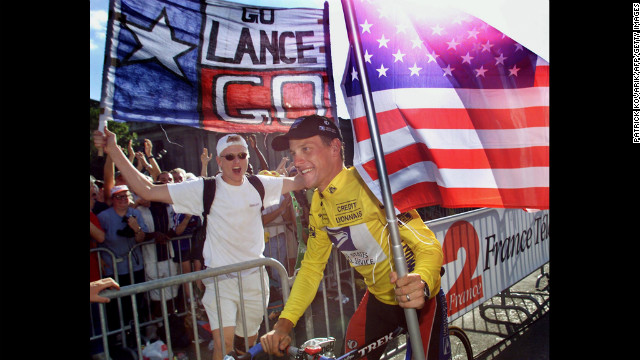 Armstrong takes his honor lap on the Champs-Élysées in Paris after winning the Tour de France for the first time in 1999.
Armstrong takes his honor lap on the Champs-Élysées in Paris after winning the Tour de France for the first time in 1999. 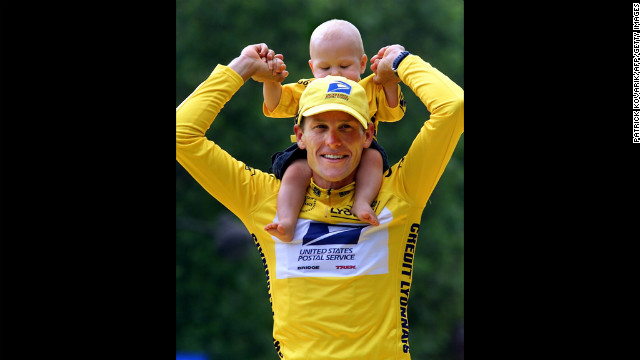 After winning the 2000 Tour de France, Armstrong holds his son Luke on his shoulders.
After winning the 2000 Tour de France, Armstrong holds his son Luke on his shoulders. 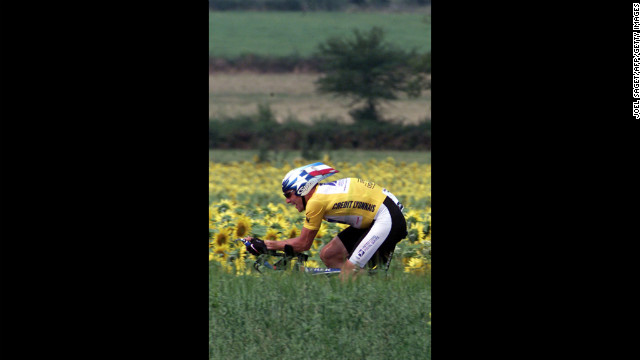 Armstrong rides during the 18th stage of the 2001 Tour de France. He won the tour that year for the third consecutive time.
Armstrong rides during the 18th stage of the 2001 Tour de France. He won the tour that year for the third consecutive time. 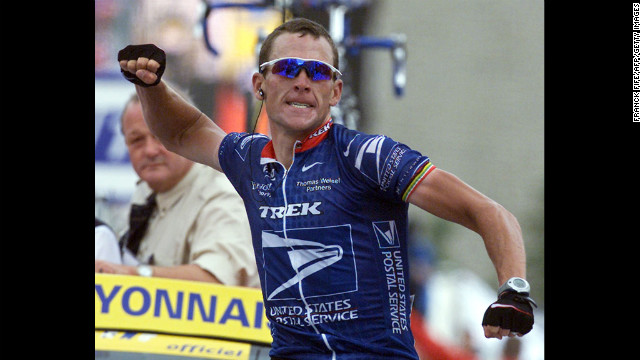 Armstrong celebrates winning the 10th stage of the Tour de France in 2001.
Armstrong celebrates winning the 10th stage of the Tour de France in 2001. 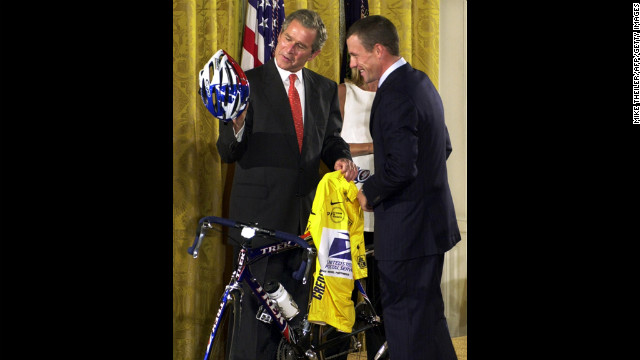 After winning the 2001 Tour de France, Armstrong presents President George W. Bush with a U.S. Postal Service yellow jersey and a replica of the bike he used to win the race.
After winning the 2001 Tour de France, Armstrong presents President George W. Bush with a U.S. Postal Service yellow jersey and a replica of the bike he used to win the race. 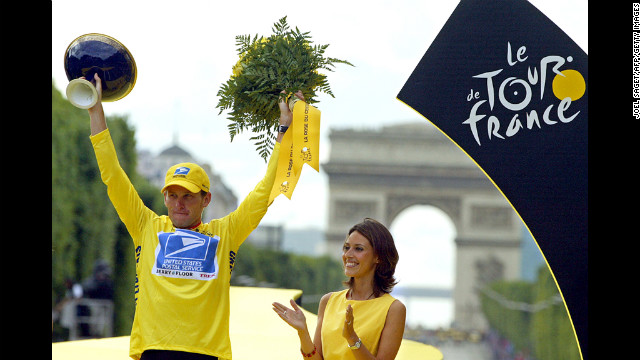 Armstrong celebrates on the podium after winning the Tour de France by 61 seconds in 2003. It was his fifth consecutive win.
Armstrong celebrates on the podium after winning the Tour de France by 61 seconds in 2003. It was his fifth consecutive win. 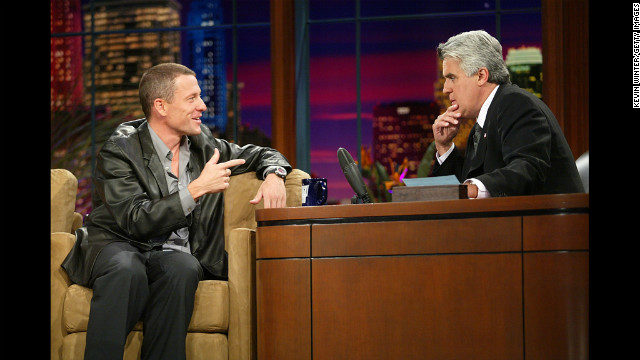 Jay Leno interviews Armstrong on "The Tonight Show" in 2003.
Jay Leno interviews Armstrong on "The Tonight Show" in 2003. 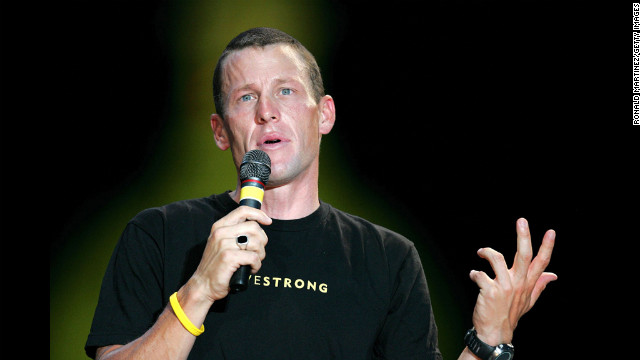 After his six consecutive Tour de France win in 2004, Armstrong attends a celebration in his honor in front of the Texas State Capitol in Austin.
After his six consecutive Tour de France win in 2004, Armstrong attends a celebration in his honor in front of the Texas State Capitol in Austin. 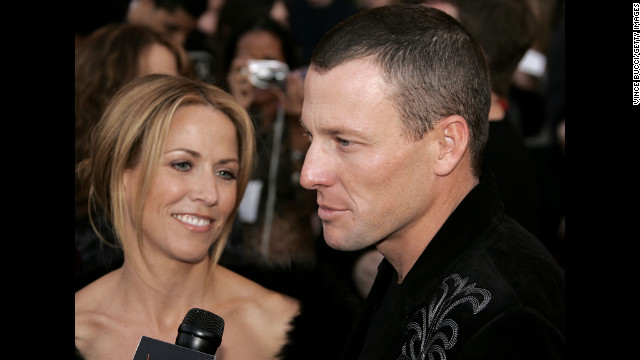 Armstrong arrives at the 2005 American Music Awards in Los Angeles with his then-fiancee Sheryl Crow. The couple never made it down the aisle, splitting up the following year.
Armstrong arrives at the 2005 American Music Awards in Los Angeles with his then-fiancee Sheryl Crow. The couple never made it down the aisle, splitting up the following year. 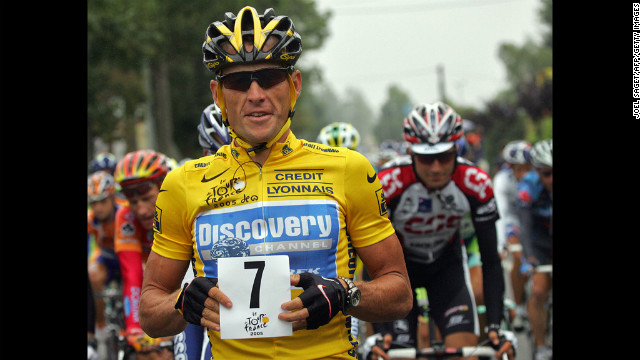 Armstrong holds up a paper displaying the number seven at the start of the Tour de France in 2005. He went on to win his seventh consecutive victory.
Armstrong holds up a paper displaying the number seven at the start of the Tour de France in 2005. He went on to win his seventh consecutive victory. 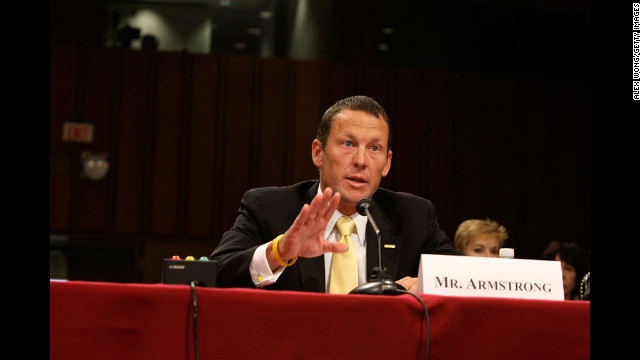 As a cancer survivor, Armstrong testifies during a Senate hearing in 2008 on Capitol Hill. The hearing focused on finding a cure for cancer in the 21st century.
As a cancer survivor, Armstrong testifies during a Senate hearing in 2008 on Capitol Hill. The hearing focused on finding a cure for cancer in the 21st century. 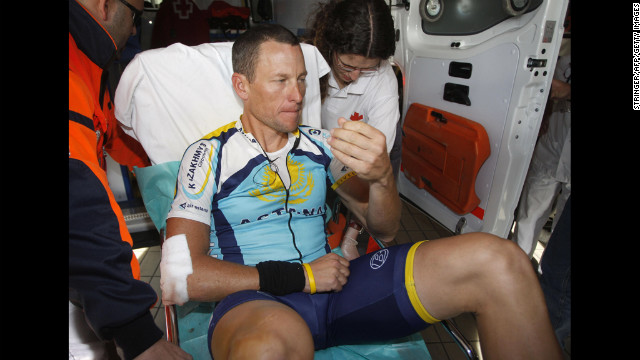 In 2009, Armstrong suffers a broken collarbone after falling during a race in Spain along with more than a dozen other riders.
In 2009, Armstrong suffers a broken collarbone after falling during a race in Spain along with more than a dozen other riders. 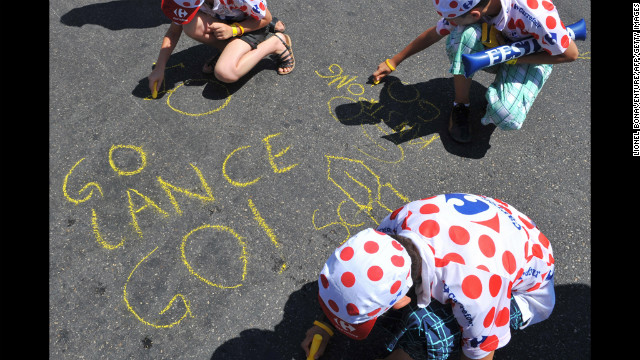 Young Armstrong fans write messages on the ground using yellow chalk ahead of the 2009 Tour de France. He came in third place that year.
Young Armstrong fans write messages on the ground using yellow chalk ahead of the 2009 Tour de France. He came in third place that year. 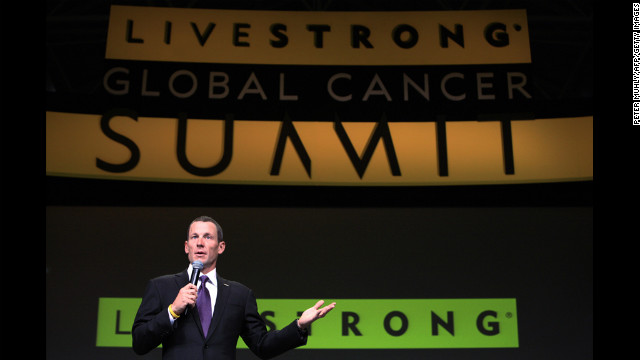 Armstrong launches the three-day Livestrong Global Cancer Summit in 2009 in Dublin, Ireland. The event was organized by his foundation.
Armstrong launches the three-day Livestrong Global Cancer Summit in 2009 in Dublin, Ireland. The event was organized by his foundation. 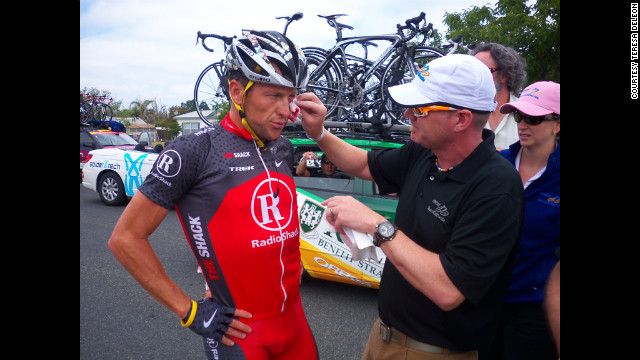 In May 2010, Armstrong crashes during the Amgen Tour of California and is taken to the hospital. That same day, he denied allegations of doping made by former teammate Floyd Landis.
In May 2010, Armstrong crashes during the Amgen Tour of California and is taken to the hospital. That same day, he denied allegations of doping made by former teammate Floyd Landis. 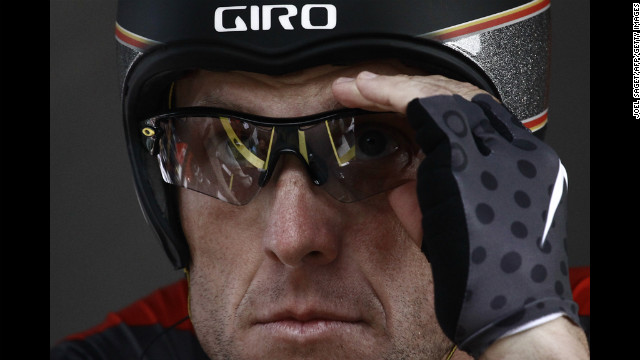 Ahead of what he said would be his last Tour de France, Armstrong gears up for the start of the race in 2010.
Ahead of what he said would be his last Tour de France, Armstrong gears up for the start of the race in 2010. 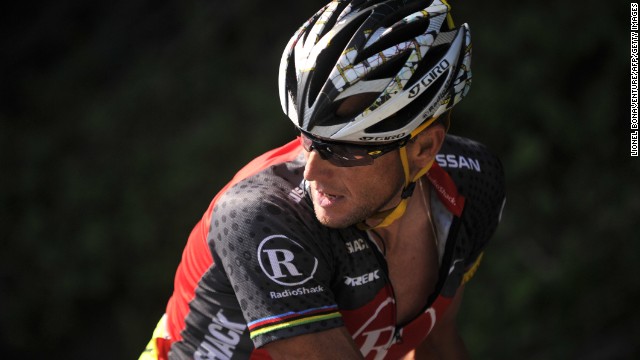 Lance Armstrong looks back as he rides in a breakaway during the 2010 Tour de France.
Lance Armstrong looks back as he rides in a breakaway during the 2010 Tour de France. 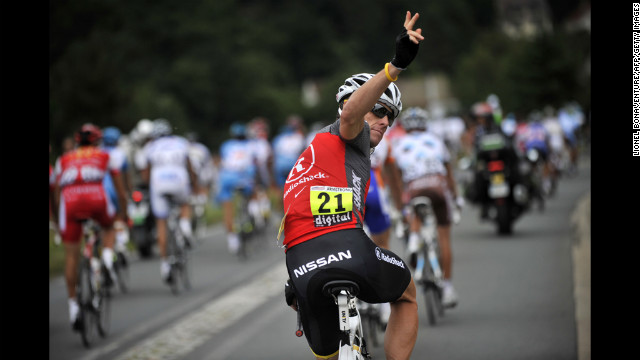 Armstrong finishes 23rd in the 2010 Tour de France. He announced his retirement from the world of professional cycling in February 2011. He said he wants to devote more time to his family and the fight against cancer.
Armstrong finishes 23rd in the 2010 Tour de France. He announced his retirement from the world of professional cycling in February 2011. He said he wants to devote more time to his family and the fight against cancer. 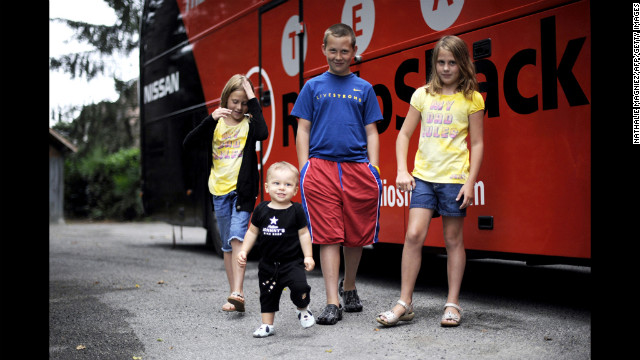 Armstrong's son Luke; twin daughters, Isabelle and Grace; and 1-year-old son, Max, stand outside the Radioshack team bus on a rest day during the 2010 Tour de France.
Armstrong's son Luke; twin daughters, Isabelle and Grace; and 1-year-old son, Max, stand outside the Radioshack team bus on a rest day during the 2010 Tour de France. 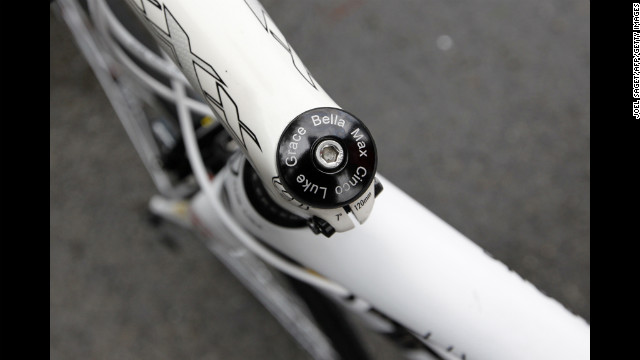 The frame of Armstrong's bike is engraved with the names of his four children at the time and the Spanish word for five, "cinco." His fifth child, Olivia, was born in October 2010.
The frame of Armstrong's bike is engraved with the names of his four children at the time and the Spanish word for five, "cinco." His fifth child, Olivia, was born in October 2010. 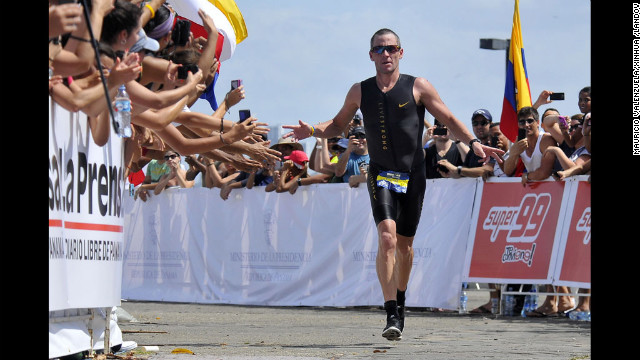 In February 2012, Armstrong competes in the 70.3 Ironman Triathlon in Panama City. He went on to claim two Half Ironman triathlon titles by June. He got back into the sport after retiring from professional cycling. Lance Armstrong over the years Lance Armstrong over the years Lance Armstrong over the years Lance Armstrong over the years Lance Armstrong over the years Lance Armstrong over the years Lance Armstrong over the years Lance Armstrong over the years Lance Armstrong over the years Lance Armstrong over the years Lance Armstrong over the years Lance Armstrong over the years Lance Armstrong over the years Lance Armstrong over the years Lance Armstrong over the years Lance Armstrong over the years Lance Armstrong over the years Lance Armstrong over the years Lance Armstrong over the years Lance Armstrong over the years Lance Armstrong over the years Lance Armstrong over the years Lance Armstrong over the years Lance Armstrong over the years Lance Armstrong over the years Lance Armstrong over the years Lance Armstrong over the years HIDE CAPTION << <
In February 2012, Armstrong competes in the 70.3 Ironman Triathlon in Panama City. He went on to claim two Half Ironman triathlon titles by June. He got back into the sport after retiring from professional cycling. Lance Armstrong over the years Lance Armstrong over the years Lance Armstrong over the years Lance Armstrong over the years Lance Armstrong over the years Lance Armstrong over the years Lance Armstrong over the years Lance Armstrong over the years Lance Armstrong over the years Lance Armstrong over the years Lance Armstrong over the years Lance Armstrong over the years Lance Armstrong over the years Lance Armstrong over the years Lance Armstrong over the years Lance Armstrong over the years Lance Armstrong over the years Lance Armstrong over the years Lance Armstrong over the years Lance Armstrong over the years Lance Armstrong over the years Lance Armstrong over the years Lance Armstrong over the years Lance Armstrong over the years Lance Armstrong over the years Lance Armstrong over the years Lance Armstrong over the years HIDE CAPTION << <
{ 0 comments... read them below or add one }
Post a Comment